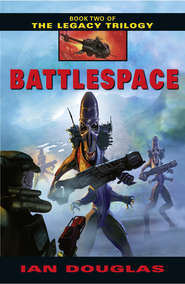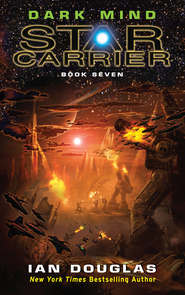По всем вопросам обращайтесь на: info@litportal.ru
(©) 2003-2025.
✖
Deep Time
Настройки чтения
Размер шрифта
Высота строк
Поля
“Not easily, sir. It’s an enormous affair, and there may be a hundred thousand people attending. It may turn out to be a lot bigger than that, as the news about Verdun moves down the Nets.”
Koenig sighed.
Washington, D.C., the former capital of the old United States, had been partially submerged by rising sea levels at the end of the twenty-first century. The capital had been moved to Columbus, Ohio, where it had remained for the next nearly three and a half centuries. Washington had slowly been claimed by swamp, mangroves, and forests of kudzu, which enveloped the exposed marble buildings and monuments. A part of the Periphery, it had been abandoned by the United States, then ignored by the new United States of North America. Tribes of Prims continued to hang on to a marginal existence there, fishing over what once had been the Mall, and fighting off periodic attacks by raiders out of the Virginia Periphery.
Late the previous year, not long after the beginning of hostilities in the civil war against the Confederation, the Pan-Europeans had attempted to take over Washington and several other parts of the North American Periphery. A sharp battle with local forces had broken the Confed attack. Since then, USNA help and technology had been pouring into the area, reclaiming the swamp, clearing old buildings and growing new ones, and freeing walls, monuments, and domes from the clinging riot of greenery.
Today, President Koenig was scheduled to fly to Washington and dedicate the reborn city, formally reinstating it as part of the USNA. Within the next six months, it was hoped, Washington would once again, after three centuries, be the North American capital. Preparations were already under way to move the physical apparatus of government from Toronto south.
Koenig wasn’t convinced that the move was a good idea. Since most of any government now was its electronic infrastructure rather than specific buildings, one city was pretty much the same as any other, and there’d even been suggestions that SupraQuito would be a better site. It had been centuries since government was dependent on a specific place. Washington, Columbus, and now Toronto all were symbols—potent symbols, perhaps, but only symbols, symbols of tradition and continuity and history. The real business of government long ago had been taken up by various AIs running in places as diverse as New New York, the Angelino-Francisco Metroplex, SupraQuito, and Tsiolkovsky, on the far side of the moon.
Humans were vital to the running of government, of course; with hardware purpose-grown in their brains from the time they were born, with in-head electronic memory and the ability to link with other people anywhere in the world, or to link with AIs possessing superhuman intelligence, government processes could be micromanaged by politicians as never before. But Koenig felt that the purely organic components of government—fallible, prone to corruption, prone to uninformed choices and bad days and just plain bad decisions—were fast becoming obsolete, save for when they were performing some of the more traditional duties of politicians …
Like presiding over the dedication of the opening of a once drowned city.
Koenig was tempted to cancel, but Marcus had a point about the crowds and Verdun. The victory in Europe had the looks of a final triumph over the Confederation. Celebration had already begun across North America … and in Europe, too, where the civil war had become increasingly unpopular. Starlight had been hammering the theme of peace for the past several months.
“Are we still on for having Constantine d’Angelo put in an electronic appearance? I gather he was pretty popular the other day in Geneva.”
“We are. They’ve grown a ten-story tall vidscreen in Washington overlooking the Mall, just like the one in the Place d’Lumiere.”
“So why can’t I put in an appearance the same way?”
Whitney shrugged. “I guess you could if you really want to, sir. But people are expecting to see you in the flesh and ten stories tall.”
And, of course, the single key difference between the president of the USNA and the leader of the new Starlight religion was that “Constantine d’Angelo” didn’t really exist—not as flesh and blood, at any rate. He was an electronic avatar, a construct created as a public face for Konstantin.
Most people with in-head electronics carried their own e-secretary with them, a pocket-sized personal assistant AI that could front for the human in handling incoming calls and routine business and be completely indistinguishable from the human prototype as it did so. These business and social stand-ins were referred to as secretaries or personal assistants or avatars and they existed only as electronic patterns of data, as images and sounds built up pixel by pixel and bit by bit by the AI generating them.
“Constantine d’Angelo” was no different, save that he claimed to be a real person. An elaborate and completely fictional background and biography had been carefully pieced together for him, and records had been put in place by USNA Intelligence proving that people had seen the flesh-and-blood d’Angelo. His parents were still alive in a Kuiper Belt greenhab; reportedly they were very private people who’d declined to be interviewed …
D’Angelo had appeared at the Place d’Lumiere projected on the giant screen overlooking the plaza in front of the ConGov pyramid and given a powerful speech decrying the Confederation’s war crimes and urging a cessation of hostilities. That speech, Koenig knew, had been meticulously crafted through recombinant memetic techniques to prepare a war-weary population for the USNA strike at the Verdun fortress, and the capture or death of Korosi, Denoix, and their cronies. The Starlight movement had been gathering strength, momentum, and the unassailable authority of the moral high ground … and no one outside of the innermost reaches of the USNA government appeared to realize that the entire movement was an electronic construct.
“What I need is a physical avatar,” Koenig said ruefully, “not just the electronic version.”
“A physical avatar,” Whitney said, thoughtful. “You mean like a touristbot?”
“Actually—”
“There are some pretty good TRs, sir.” The initials stood for “teleoperated robot,” and referred to simulacra that could be “ridden” long-distance by human operators.
“That won’t be necessary, Marcus.”
“No, really, sir. Dopplebots. We could have a stand-in made up for you that—”
“No, Marcus. I wasn’t serious.”
There were public figures, Koenig knew, simsex actors especially, who mentally rode robots designed to be indistinguishable from their human counterparts. And some tourists used them to explore the surface of Venus or the streets of distant cities without leaving home. He’d always found the idea of robotic public appearances gimmicky … and mildly rude. Showing up in a robot body when people thought it was you seemed deceptive, and a violation of the public trust. If the public spotted the stand-in—and no robotic replica was perfect—he’d never hear the end of it.
He sighed. “When do I have to be there?”
“Twelve thirty, sir. The program begins at one. A shuttle is scheduled to leave Toronto’s waterfront at twelve ten, with a twelve-minute flight.”
The maglev tubes to Washington weren’t open yet.
“Okay. Let’s see what we can get done before then.” He scanned again down the list of items appearing on his in-head, then projected it onto a virtual screen floating above his desk. “Tell me about this one … ‘Collapse in Geneva.’”
“A Starlight mob stormed the offices of the Confederation Senate this morning,” Whitney told him. “The police appear to have joined the mobs, and there’s a complete breakdown of social order …”
In Switzerland, of all places? Orderly, clean, law-abiding Switzerland? It seemed like the rankest blasphemy.
USNS/HGF Concord
In pursuit
0745 hours, TFT
By the time Concord had matched vectors with the alien and closed the range to a few hundred kilometers, Dahlquist had a real problem on his hands.
It wasn’t a matter of betraying the United States of North America … not at all. He’d been following the news feeds while Concord had been posted out in Vesta space, and it was clear that the civil war there was all but over. The Earth Confederation’s remaining fortresses had fallen, its leaders were dead or captured, the Geneva government itself under siege by religious fanatics. If he’d been able to seize Charlie One in the name of the Confederation—and the thought had crossed his mind hours earlier—who the hell would he give it to?
In any case, he remained loyal to the USNA. It was the Prim Sandy Gray he didn’t like, and whom he would disgrace if he possibly could. The guy never should have been promoted to flag rank so quickly—should never have been promoted past lieutenant at all. As Dahlquist saw things, Primitives never developed the same facility with in-head technology as people who’d been wired from birth. They might serve well enough in the military as enlisted personnel, but never as officers.
He didn’t realize it, but he was recapitulating an ancient argument of military service that went back to the old United States, to the British Empire, and even before: you had to be a college graduate to be commissioned as an officer. Arguably, it was an outgrowth of feudalism, when only landed gentry—the nobles—could afford armor and a horse, leaving peasants, by default, to become foot soldiers.
With the presumption that only the wealthy could afford formal education—and a formal education was required to teach a student the history, the tactics, and the deportment necessary for the proverbial officer and a gentleman—it was a system that had worked, and worked well, for something like two thousand years.
There were exceptions, of course. There always had been—the mustangs who came up through the ranks, the battlefield promotions, the noncom who found himself the senior man of an embattled platoon or company. In Dahlquist’s opinion, those scarcely counted. In modern combat, it was vital that an officer have that perfect union of the organic and the machine, the balance of human mind and AI, the speed and grasp of the computer melded perfectly with the intuition and the inventiveness of the human brain.
And upstart Prim admirals just didn’t cut it.
Concord’s AI was painting an image of the alien now. Three of America’s search-and-rescue tugs had already rendezvoused with the ship, latched on with ultra-strong cables, and were now decelerating the alien. Four of the star carrier’s fighters were present as well, standing off somewhat as they oversaw the deceleration. The sun was a tiny, shrunken bright star in the distance, now more than five light-hours—some forty AUs—off, roughly the average distance of tiny Pluto from Sol.
Two USNA warships—a frigate and a destroyer—were still thirty minutes away from rendezvous. That Concord had managed the feat before them was due entirely to the High Guard cutter’s beefed-up maneuvering suite. The same held true for the three SAR UTW-90s—the cutter and the tugs were designed as intercept vehicles, and thus outpaced the warships.
Each SAR vessel carried a crew of five under the command of a lieutenant or a lieutenant commander. Dahlquist was now the senior officer present.
Opportunity presents itself, he thought.
“Open a channel to the lead SAR tug,” he told his own communications officer.
“Lieutenant Commander Mitchell is on the line, sir.”
“Commander Mitchell?” he said. “This is Commander Terrance Dahlquist of the High Guard ship Concord. I am maneuvering to board the alien.”
“Concord,” a voice replied in his head, “this is Fly Catcher. That’s negative on rendezvous, repeat, negative. We are under orders not to board the alien under any circumstances until America has joined us.”
“I am disregarding those orders, Fly Catcher. Maintain deceleration. We’ll take it from here.”











